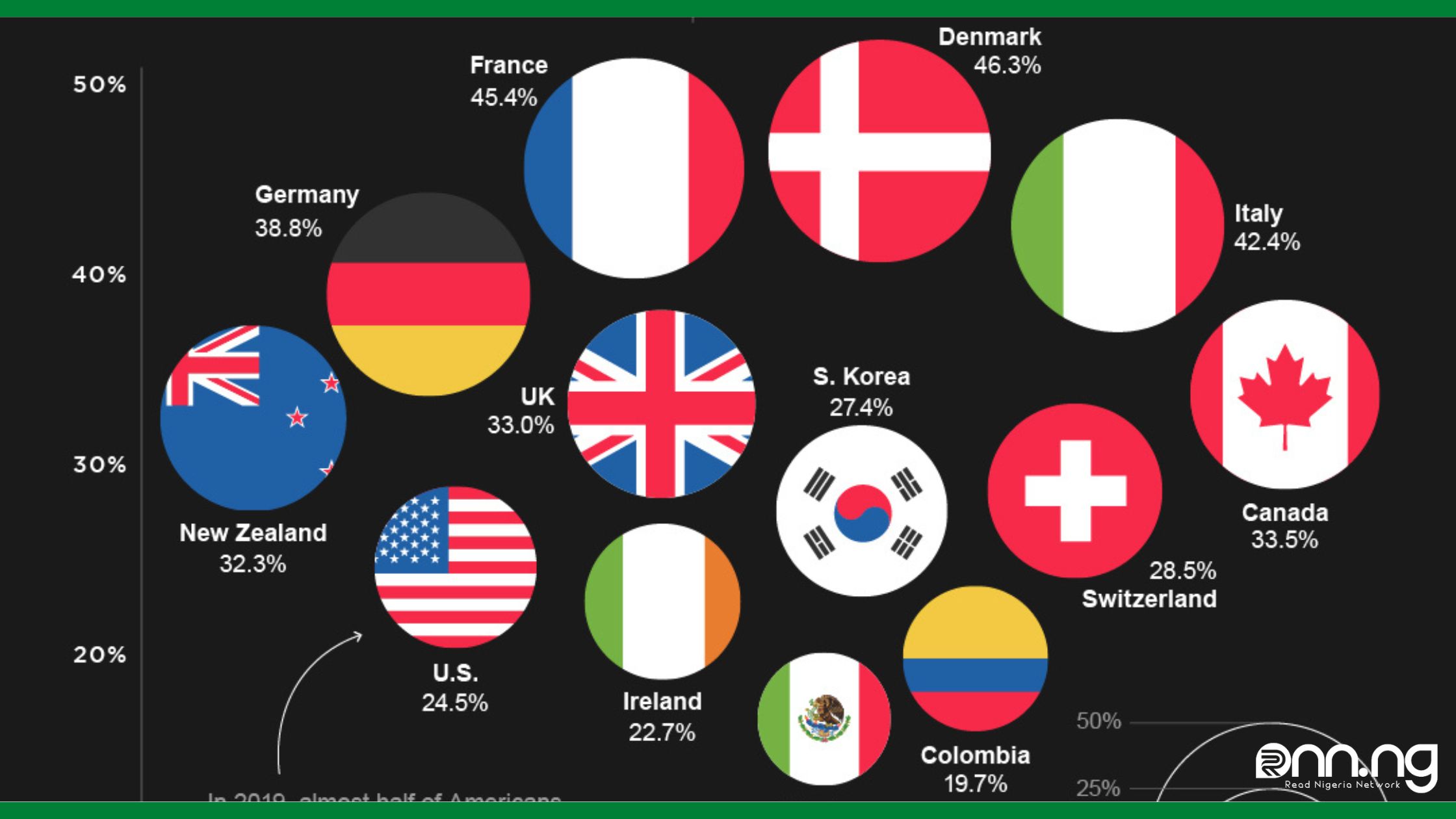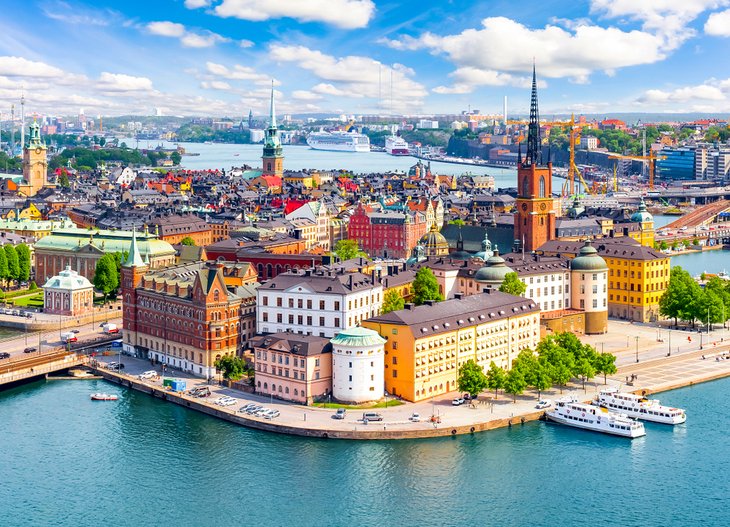Top Lists
Top 10 Countries With The Highest Tax Rate
Income tax is one of the most important stream of revenue for every government. In this article, we explore the top 10 Countries With The Highest Tax Rate.

Have you ever wondered which country has the highest tax rate? Some countries’ tax rates are bigger than others and therefore if you do not know Countries With The Highest Tax Rate, then this article is for you.
The government of a county charges income tax, which is a mandatory tax. This tax funds developmental projects, government research, defense, and other similar activities.
Taxation differs significantly across countries. Every country has a unique way of calculating and implementing Taxes. Some countries may choose not to tax their citizens at all, while others may levy a tax on several other commodities and assets apart from income as well
In this article, RNN will highlight the countries with the highest Tax rate.
However, the table below will not only list the countries but also state their tax rate.
| Rank: | Country: | Tax Rate: |
| 1. | Ivory Coast | 60% |
| 2. | Finland | 56.96% |
| 3. | Japan – 55.9% | 55.9% |
| 4. | Denmark | 55.9% |
| 5. | Austria | 55% |
| 6. | Sweden | 52% |
| 7. | Aruba | 52% |
| 8. | Belgium | 50% |
| 9. | Israel | 50% |
| 10. | Slovenia | 50% |
1. Ivory Coast – 60%

Ivory Coast is the first country on the list of Countries With The Highest Tax Rate.
The Personal Income Tax Rate in Ivory Coast also known as Côte d’Ivoire stands at 60 percent. Tax on industrial and commercial profits in Côte d’Ivoire is levied at 25%, subject to a minimum tax.
However, the rate is 30% for companies in the telecommunication, information technology, and communication sectors.
In Ivory Coast, the Personal Income Tax Rate is a tax collected from individuals and is imposed on different sources of income. Some of this personal income is from labor, pensions, interest, and dividends. The benchmark we use refers to the Top Marginal Tax Rate for individuals.
Revenues from the Personal Income Tax Rate are an important source of income for the government of Ivory Coast.
READ ALSO: Countries With The Largest Muslim Population
2. Finland – 56.95%

Finland’s top marginal tax rate of 56.95% makes it second on the list of the Top 10 Countries With The Highest Tax Rate.
Let’s start with the facts about how much tax people pay on average in Finland. First of all, the taxation on earned income in Finland is progressive, so the more you earn, the bigger the proportion of tax you pay.
According to Wikipedia, Taxation in Finland is mainly carried out through the Finnish Tax Administration, an agency of the Ministry of Finance. Finnish Customs and the Finnish Transport and Communications Agency Traficom, also collect taxes.
Taxes collected are distributed to the Government, municipalities, church, and Social Insurance Institutions.
READ ALSO: Highest Paying Countries for Pharmacists (Top 10)
3. Japan – 55.9%

Among the Top 10 Countries With The Highest Tax Rate in Japan. The personal Income Tax Rate in Japan is expected to reach 55.95 percent, according to Trading Economics global macro models and analysts’ expectations.
In the long term, Japan’s Personal Income Tax Rate is projected to trend around 55.97 percent in 2023, according to our econometric models.
In Japan, permanent residents pay taxes on all their income worldwide. Non-residents pay taxes only on the income they earn in Japan. Non-permanent residents are taxed on their income from sources other than foreign countries, including certain capital gains, if they are not brought into Japan. They may also be taxed on a portion of their income earned in foreign countries if it is received or brought into Japan.
READ ALSO: Top 10 Countries With the Highest Suicide Rate
4. Denmark – 55.9%

The Danish government imposed a total tax rate equivalent to 55.9% of per capita income to meet the needs of its people. According to Wikipedia, Taxation in Denmark consists of a comprehensive system of direct and indirect taxes.
Ever since the income tax was introduced in Denmark via a fundamental tax reform in 1903, it has been a fundamental pillar in the Danish tax system.
Today various personal and corporate income taxes yield around two-thirds of the total Danish tax revenues, indirect taxes being responsible for the last third. The state personal income tax is progressive while the municipal income tax is a proportional tax above a certain income level.
READ ALSO: Top 10 Countries With The Highest Number Of Churches
5. Austria – 55%

Austria also demands that its people pay for that privilege, as the top marginal tax rates stand at 55%. Income tax is called “Einkommensteuer” in Austria and there is a progressive rate of income tax (0-55%). The tax assessment base equals the sum of income minus income-related expenses and tax-free amounts for a calendar year.
Along with social insurance contributions, income tax is automatically deducted from employees’ wages or salaries and sent to the tax authority by the employer.
There are several other taxes in Austria that you need to be aware of as an ex-pat, as follows:
- Real Estate Transfer Tax
- Municipal Tax
- Vehicle Tax
- Corporation Tax
- Capital Gains Tax
However, Austria’s tax rate of 55% makes it one of the Top 10 Countries With The Highest Tax Rate.
6. Sweden – 52.%

The Personal Income Tax Rate in Sweden stands at 52 percent. Taxation in Sweden on salaries for an employee involves contributing to three different levels of government: the municipality, the county council, and the central government. Social security contributions are paid to finance the social security system.
Moreover, Sweden has a taxation system for income from work that combines an income tax (paid by the employee) with social security contributions (employer contributions) that are paid by the employer.
The total salary cost for the employer is thereby the gross salary plus the payroll tax. The employer makes monthly preliminary deductions (PAYE) for income tax and also pays the payroll tax to the Swedish Tax Agency.
7. Aruba – 52%

According to the Aruba tax system, if an individual is considered to be a resident of Aruba – residency to be determined by the circumstances – the individual is subject to personal income tax on his worldwide income.
If the individual conducts an enterprise, different regulations apply to determine the taxable income, which regulations are similar to the corporate income tax (we refer to the Fundamentals “corporate income tax”). A non-resident of Aruba is only subject to personal income tax on Aruba over certain sources of income.
Sources of income non-resident. A non-resident is subject to Aruba income tax for income derived from amongst others:
- Income from employment performed in Aruba.
- Real estate situated in Aruba
- Salary received as a managing director or supervisory board member of an Aruba company
- Substantial interest.
However, It is important to note that a non-resident individual is subject to the personal income tax as soon as they work 1 day or more in Aruba.
8. Belgium – 50%

One of the Top 10 Countries With The Highest Tax Rate is Belgium. Tax rates in Belgium are some of the highest, The personal tax income is 50%.
In Belgium, taxes are collected on both state and local levels The most important taxes are collected on the federal level, these taxes include an income tax, social security, corporate taxes, and value-added tax. At the local level, property taxes as well as communal taxes are collected.
The amount of taxes a person in Belgium has to pay depends on whether you are or you are not a resident of the country. For a resident (a person whose work or family home is in Belgium) it is clear.
But in the case of non-residents, there are two scenarios. If you are a non-resident who lives in Belgium for at least six months of the year (183 days) and you are registered with your local commune, you are classified as a resident.
It means you are taxed by Belgium’s income tax on your worldwide income. But if you are a non-resident who lives in Belgium for fewer than 6 months (183 days) during the year, you have to pay Belgium income tax only on income you earned in Belgium.
9. Israel – 50%

Israel has a top marginal tax rate of 50%. The income tax on individuals in Israel for the 2022 year ranges between 10% and 50%. Which tax rate you pay will depend on the type of income and how much you earn.
Taxation in Israel includes income tax, capital gains tax, value-added tax, and land appreciation tax. The primary law on income taxes in Israel is codified in the Income Tax Ordinance.
As a basis for income, Israeli residents are taxed on their worldwide income, while non-residents are taxed only on their Israeli-sourced income. Payment includes employment, business income, and passive income from bank deposits and savings.
An individual is a resident if his “center of life” is in Israel. If an individual spent 183 days or more, in Israel during the current tax year or; if an individual spent 30 days or more in Israel during the current tax year and the total days spent in Israel during the current tax year and the preceding two years were 425 days or more.
10. Slovenia – 50%

Rounding off the list of the Top 10 Countries With The Highest Tax Rate is a country named Slovenia. Slovenia still imposes a whopping 50% tax on its citizens.
The Slovenian tax system consists of various taxes created by the country’s administration to achieve fiscal, economic, and social objectives.
The taxation system in Slovenia is also an essential part of the economic and socio-political system, along with the social security contributions, customs systems, and other charges, that form the fiscal system of Slovenia. All persons have taxation obligations, including those interested in immigration to Slovenia.
Taxes in Slovenia are collected by the Financial Administration of the Republic of Slovenia and they consist of the following types of taxes:
- value-added taxes,
- personal income taxes,
- capital gain tax
Before starting a business in Slovenia, you should understand the tax rates and obligations under Slovenian law. The business taxes in Slovenia include:
- Value Added Tax (VAT) and
- Corporate Income Tax,
While each individual has to pay also personal income tax.
Summary
Income tax is one of the most important streams of revenue for every government. As we have seen from various lists, the tax varies significantly across different countries. A comparison of tax rates by countries is difficult and somewhat subjective, as tax laws in most countries are extremely complex and the tax burden falls differently on different groups in each country.
This article highlights the top 10 countries with the highest tax rates. Here’s a summary:
- Ivory Coast – 60%
- Finland – 56.96%
- Japan – 55.9%
- Denmark – 55.9%
- Austria – 55%
- Sweden – 52%
- Aruba – 52%
- Belgium – 50%
- Israel – 50%
- Slovenia – 50%
